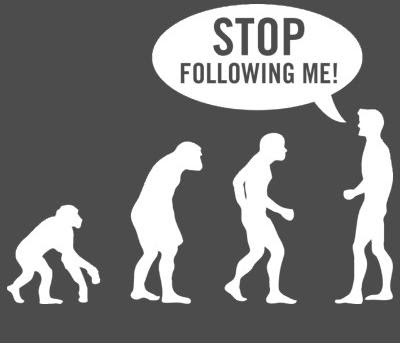Serendip is an independent site partnering with faculty at multiple colleges and universities around the world. Happy exploring!
The Evolution of "Evolution (n.)"

It may be worthwhile to consider the evolution of the term: evolution. I decided to consult the OED to see what’s out there. Some of the following definitions are rare, even obsolete now, but they can be useful in understanding where our current understanding of the word comes from. They can help us “make sense of it” and come up with our own stories. Overall, evolution is quite the interdisciplinary word. There are multiple good stories of evolution.
Evolution, n.
Etymology: classical Latin
First recorded use: 1616
I. Amendment or change of position.
1.
a. (Military and Navy) A manoeuvre executed by troops or ships to adopt a different tactical formation.
b. A (tactical) change in behavior or attitude.
2.
a. A wheeling, twisting, or turning movement; (in later use especially) one performed in dancing or gymnastics. Occasionally, a regulated movement of a machine part.
b. A twist, an intricate form.
II. The process of unrolling, opening out or revealing.
3.
a. The action or process of opening out, unfolding, or unrolling; especially the unfolding or progression of a series of events in orderly succession.
b. (Chiefly Biology) Emergence or release from an envelope or enclosing structure; protrusion, evagination.
4. (Math)
a. (Geometry) The unfolding or opening out of a curve, or the successive transformation of a curve by the alteration of the conditions which define it.
b. (Algebra) The extraction of any root from any given power.
III. The process of development.
5. (Biology)
a. The process by which living organism or their parts develop from a rudimentary to a mature or complete state.
b. The process by which, according to the theory of preformation, the embryo or germ is developed or expanded from a pre-existing form, rather than originating in the act of fertilization.
6.
a. The action or process of developing in detail what is implicit in an idea or principle; the development of an argument, design, etc.
b. The outcome of such a process of development.
7.
a. A process of gradual change occurring in a system, institution, subject, artifact, product, etc. especially from a simper to a more complex or advanced state. (A gradual and natural development as opposed to a sudden or instigated change.)
b. A developed from of an earlier artifact or product.
8.
a. (Biology) The transmutation of animals, plants and other living organisms into different forms by the accumulation of changes over successive generations; the transmutation of species; the origination or transformation of an organism, organ, physiological process, biological molecule, etc. by such a series of changes.
b. Theory of Evolution The proposition that all living organisms have undergone a process of alteration and diversification from simple primordial forms during the earth’s history; a scientific theory proposing a mechanisms for this process, especially that based on Darwin’s theory of the natural selection of genetically inherited and adaptive variation.
9.
The formation and subsequent development of the solar system, starts, or the physical universe in general, by the action of natural processes; the natural origination or development of geological or geographical features.
10.
Progression from simple to complex forms, conceived as a universal principle of development, either in the natural world or in human societies and cultures.
IV The process of emission
11.
(Chemistry) The emission or release of gas, heat, light, etc.; the disengagement of a substance from combination; an instance of such a process.
Some common themes: Change, Process, Movement, Deliberate (to a certain extent), Complexity, One thing leads to another, Development, Unfolding story, Slow, “Natural’, Connection drawn between biological/cosmic evolution, Can be generative or degenerative…and that’s just a start!




Comments
Post new comment